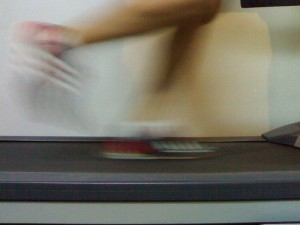by Michelle Sutton-Kerchner
Fitness pros are often asked the best time of day to exercise. Research shows conflicting answers to this common question. Discover your optimal timeframe. Then, schedule your next workout for maximum results …
Is Consistency Your Issue?
Despite contradictions on the best time to break a sweat, research does prove morning exercisers are usually most consistent. If you’re struggling to make exercise a habit, experts suggest you tackle it upon waking. Procrastination allows a day’s worth of excuses to get in the way, some legit (work, family care, sleep) and others not (had to shampoo the dog).
 Don’t let good intentions evade you. Set the alarm and start by hopping out of bed. Be sure to warm-up, especially if you tend to wake up with sore, stiff muscles. Body temp is lowest in the morning. Allow yourself to gradually awaken with gentle stretching and warm-ups. Get blood flowing freely. A quick shower can loosen and wake you. Drink a full glass of water; after extended sleep, we often are partially dehydrated.
Don’t let good intentions evade you. Set the alarm and start by hopping out of bed. Be sure to warm-up, especially if you tend to wake up with sore, stiff muscles. Body temp is lowest in the morning. Allow yourself to gradually awaken with gentle stretching and warm-ups. Get blood flowing freely. A quick shower can loosen and wake you. Drink a full glass of water; after extended sleep, we often are partially dehydrated.
Morning exercisers also have the advantage of improved concentration and increased energy to begin their day. Literally, these folks can hit the ground running. Increased metabolism and heart rate from a morning routine can turn you into a calorie-burning machine. And, who knows when a generous coworker might bring in morning pastries.
Are You Lonely?
Not everyone is an exercise loner. Many want to have a workout buddy. Hence, the lunchtime or break-time workout exists. Check the Center for Group Fitness express classes held around noon. Bring a colleague or classmate, and share the exhilaration of a noontime workout. Bond beyond the cubicle.
Or, enjoy off-site camaraderie amidst your day of paperwork and dealing with a grouchy officemate or demanding boss. The Center welcomes you to a brief escape.
If you can’t afford to leave the premises every day, ask a friend to join you for a walk. Bring mini weights for a quick strengthening session. Practice a new Yoga position. (Under desk pose, anyone?)

The sense of accomplishment beyond your usual 9-to-5 can jumpstart the afternoon. You did something for your health. Exercising during a midday break comes with time-constraints though. This may be ideal for a quick session to complement your usual allotted exercise time. It also keeps momentum on days when a full-workout may not be possible.
According to health experts, lung function is diminished at noon. Although the explanation is uncertain, pulmonary physicians speculate it may be the result of hormone production or the side-effect of another bodily function. Note this during midday workouts and adjust intensity accordingly.
What Are Your Fitness Goals?
If building muscle and increasing endurance are priorities, research suggests you get busy in the afternoon from 3 p.m. to 7 p.m. Your body is ready. Muscles are warm, hormone levels and body temperature are at peak, and lungs are functioning best. You are ready for that exercise-induced mental and physical release, primed for an intense workout.
Injury is less common in afternoon workouts. Muscles are warm, flexible, and strongest. The mind is sharper, quick to alert of any warning signs. A late afternoon routine is also a great stress-reliever. Let go of the day’s tensions on the Exercise Floor. It’s better than soothing them with comfort foods later in the evening or taking them out on loved ones.
Researchers at the Stanford University School of Medicine studied the effects of exercise on sleep patterns of people ages 55 to75 who were not physically active and had insomnia. The study group introduced moderate afternoon exercise on alternating days for 20 to 30 minutes. As a result of this exercise regimen, participants fell asleep 50 percent quicker and stayed asleep approximately one hour longer.
An afternoon workout may act as a sleep aid for those with insomnia. Experts advise them to try exercising later in the day. However, adequate time still should be allowed prior to sleeping for the body to become calm.

Fast facts:
- Anaerobic performance, such as sprinting, improves by 5 percent in the late afternoon.
- Aerobic capacity is approximately 4 percent higher in the afternoon. You can endure more for longer.
Beware when scheduling late afternoon workouts. It’s one of the most hectic times of day. It’s easy to rush through without squeezing in a workout. A late-running meeting or a chatty neighbor at the mailbox can quickly derail your efforts. Dinner can only be delayed for so long.
Late for Exercise?
From late afternoon until evening, perceived exertion is low. This is a great mindset to work harder and move faster than you realize. You will be more tolerant of exertion.
By evening, the body is warm and flexible. And tired. Take care not to hurt yourself or reduce your workout’s effectiveness with sloppy form and moves. It also may take a couple hours to unwind after a strenuous workout, making sleep difficult.
The Best Time to Burn
New research indicates an empty stomach may burn the most calories. Two study groups exercised and performed the same workout; one group exercised after breakfast and the other group before breakfast. Both groups were fed a diet high in sugar, fat, and calories.
The group that exercised before eating, despite the bad diet, did not gain weight. This lends credibility to the unconventional theory a workout for weight loss is best achieved on an empty stomach. However, this also can be dangerous. Healthcare experts still recommend consuming a healthy snack or small meal, with proper hydration, prior to exercise. Otherwise, you risk feeling dizzy, fatigued, and light-headed, during which no calories are burned. Overall, the increased calories burned are not significant enough to outweigh the risks of a “fasted” workout.
Your Rhythm
 Whether you’re an early bird or a night owl is determined by your body’s unique circadian rhythm. Human sleep and wake periods follow this cycle, which helps regulate body temperature, blood pressure, alertness, metabolism, and other physiological functions.
Whether you’re an early bird or a night owl is determined by your body’s unique circadian rhythm. Human sleep and wake periods follow this cycle, which helps regulate body temperature, blood pressure, alertness, metabolism, and other physiological functions.
Research proves an individual’s circadian rhythm, although inborn, can be reset. You may have spent college years eating pizza at midnight while pulling all-nighters. That doesn’t mean you won’t readily rise with the sun when you’re a thirty-something with kids and a career. Our environment, and the realities of our lifestyle, can reset our biological clock.
Set a time to exercise that works for you. The body can adjust and reset its rhythm to accommodate your schedule. There are enough demands and distractions in life to jeopardize workout time, whenever it may be. Commit to a convenient time, despite all else, to more easily accomplish a life of fitness. Your body will learn to expect exercise at whatever time you train it to be workout-ready. Use a habitual time and your body will be ready and waiting in its strongest form of the day.
At the Center, anytime is the best time. You call the shots for training sessions, swim lessons, Pilates reformer work, and fitness programs. We’re here early and stay late. Perhaps your best workout time is when Childcare is doing that fun craft your kids love. Or, when Group Fitness is holding your newest favorite class. The best time just might be when that special someone shows up on the treadmill. Hey, your workout buddy! What were you thinking?
Sources
“Study Finds Late Afternoon Is Best Time to Work Out,” by Jeannine Stein at www.baltimoresun.com.
“What Is the Best Time of Day to Exercise?” by Elizabeth Quinn at www.about.com.
“What’s the Best Time to Exercise?” by Leanna Skarnulis at www.webmd.com.
“When Is the Best Time to Exercise?” by Jonny Bowden at www.thatsfit.com.
Image Credits
Watch (introductory picture): http://www.flickr.com/photos/sabihspeaks/6015579078/
Morning workout: http://www.flickr.com/photos/lululemonathletica/4883556869/
Necktie: http://www.flickr.com/photos/donovanhouse/2485994719/
Treadmill: www.flickr.com/photos/mahidoodi/199747855
Skies: http://www.flickr.com/photos/kikisdad/112882920/
 Fitness & Wellness News Your Source for Fitness News, Wellness News, Health News, and Nutrition News!
Fitness & Wellness News Your Source for Fitness News, Wellness News, Health News, and Nutrition News!



